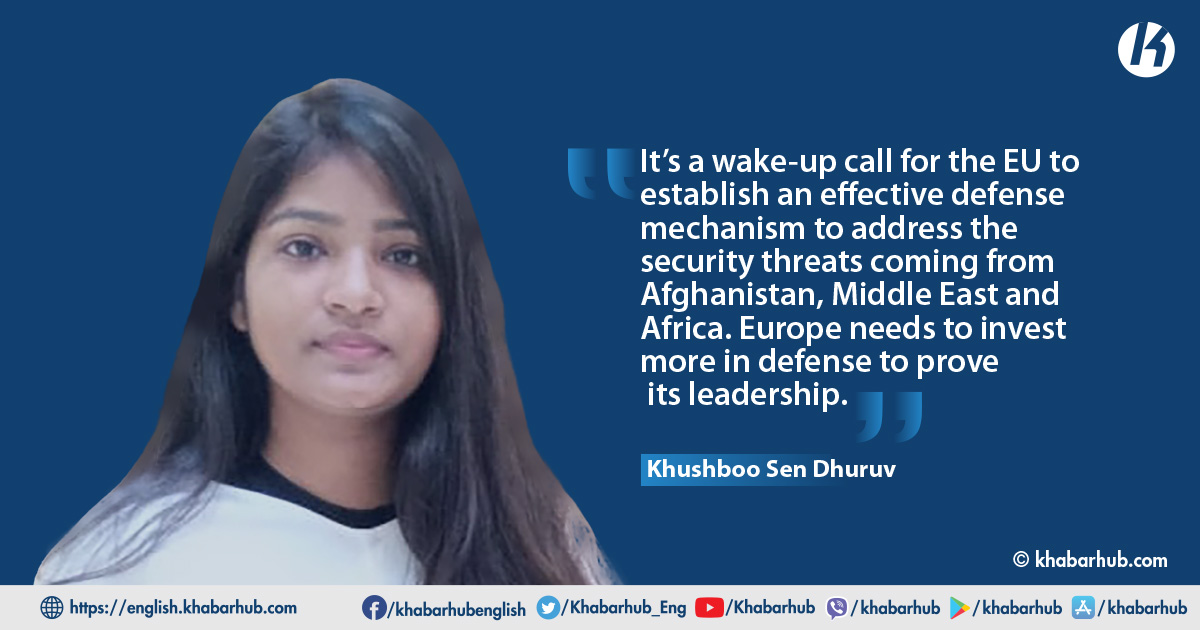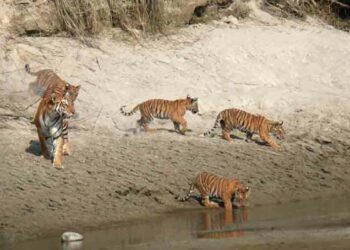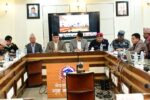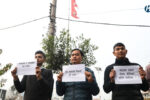The drawdown of the United States forces from Afghanistan challenges the security rise in the world. Upheaval in Afghanistan created chaos around the world.
The threat of terrorism and mass exodus of Afghan after Taliban takeover elevated huge tension for Europe. Europe’s “age of innocence is over”, and it is a wake-up call for the European Union to build its military capability.
US: Invading and Vacating Afghanistan
After witnessing the horrifying terrorist attack on 11 September 2001, the US under President George W. Bush declared war against terrorism by invading Afghanistan.
The attack was persuaded by Al-Qaeda under the leadership of Osama bin Laden who was in Afghanistan under the protection of the Taliban.
Taliban refused to surrender the Bin laden, then the US military invaded Afghanistan through military intervention to clear the Taliban, eliminate terrorism and support democracy.
Since the end of the Cold war, Europe has gradually evolved as a security actor towards a broad security notion ranging from illegal immigration and refugee crisis to organized crimes and transnational terrorism.
The emergence of the EU in 1992 as a leader in global politics witnessed new security challenges in the form of civil war in its backyard.
The breakout of civil war in Yugoslavia and separation of the Balkans states, and the attack on hegemon power was a massive shock to the Union identity.
European states have made a very large investment in Afghanistan’s peace and security. However, after the return of the Taliban in the country, European states are in big shock.
In the response to the terrorist attack, for the first time in history article 5 was invoked by the North Atlantic Treaty Organisation (NATO) which stated attack on one member of the alliance shall be considered an attack on all.
The extraordinary sympathy and alliance solidarity were reflected in many European countries. We all are American (Nous sommes tous Américains) was published in the French newspaper, Le Monde on 13 September 2001 in solidarity with the US.
This kind of cooperation between the EU-US was shorted-lived, as it marked the split division among the member states over the US decision to launch a pre-emptive strike in Iraq in the form of self-defense.
The United Kingdom and Spain supported the US’ decision, on the other side, French and German refused the American position that created internal disputes within the EU itself.
Many European have a misconception that Al-Qaeda is similar to other terrorist groups, however, after witnessing bombings in Madrid (2004), London (2005), and Paris (2015 and 2016) raised a serious concern about Al-Qaeda’s threat to Europe.
Thus, the EU’s feeble approach, faltering steps and lack of strategic understanding towards counter-terrorism measures divided the member countries and questioned the EU identity as an actor in global politics.
The absence of a hard power approach and ineffective defense structure led to division among the member states over their strategic interests and shared interests in the EU.
On 14 April 2021, President Biden made remarks towards Afghanistan remembering the 2001 terrorist attack on the nation.
Since 2001, the US has settled its troops in Afghanistan to combat future terrorist attacks to fight against Al Qaeda.
Over the two decades, security threats became more diverse and enlarged. Therefore, the US decided to end America’s longest war, called the withdrawal of its troops.
The US exit from Afghanistan challenged the Union’s credibility as a security leader in security and defense. For their security and national interest European states are solely dependent on NATO.
Out of the 27-member states, 21 EU member states are also the Member of NATO, while Iceland and Norway are only two countries in Europe only members of NATO, not the EU.
The UK left the Union umbrella on 1 February 2020, nevertheless, yet a member of NATO produces challenges of European future defense cooperation.
Removing troops from Afghanistan has increased pressure for NATO and debate has started on its legitimacy and commitment to the global scene.
The head of the Christian Democratic Union Party, Armin Laschet (The conservative candidate to succeed German Chancellor Angela Merkel) of Germany said the US decision to pull out its arm forces from Afghanistan is the biggest disaster for NATO.
Similarly, other allies of the US in the transatlantic alliance perceived US withdrawal as against their national security and interests.
EU in Afghanistan
Since the end of the Cold war, the EU has been involved in Afghan affairs related to peace and security. Since 2002 the EU is providing development assistance in Afghanistan.
From 2014 to 2020, the EU has provided 1.4 billion Euros for activities such as sustainable growth in employment, basic and social services, and restore peace, stability and democracy in the country.
The EU always remained a soft power to deal with security matters through multilateral organizations based on shared values and principles.
After the US decision to withdraw armed forces from Afghanistan raised serious concern on the implication of European policy.
European states have made a very large investment in Afghanistan’s peace and security. However, after the return of the Taliban in the country, European states are in big shock.
The EU realized that the hard power approach is necessary to develop its own defense capacities to protect its own boundary and people.
Worldwide, it raised debate on how the EU can establish itself as a foreign policy power by maintaining its economic encumbrance with its diplomatic and potential military encumbrance.
Europe needs to invest more in defense to prove its leadership. Therefore, the EU requires better coordination between the member states, consent-based decision making and contribution in the development and security.
The burden on Europeans has increased to engage in crisis management in their own neighborhood. It also revealed the realities of Europe that how much Europeans were dependent on American defense capability and military support.
With their capability, the Europeans would not be able to evacuate their personnel and local forces from Afghanistan.
It also shows the future of European security and defense in the region and raises concerns on how long would it last without effective strategy policy and weak defense mechanisms.
It became more challenging for European military intervention missions in Iraq, Libya and Afghanistan to prove its legitimacy within and beyond Europe.
That indeed has affected Europe strategically but simultaneously Afghanistan catastrophe ground provides a test case for European strategic autonomy and its ambitions to be with the country. It is the best time for Europe to rethink its Common Foreign and Security Policy.
Emerging geopolitical leaders such as China, Russia and Pakistan, among others causing challenges and threats to the world.
It is the right time for the EU to be an influential force in Afghanistan to be a global actor in security and defense. French Finance Minister Bruno Le Maire on 4 September 2021 advised the EU to rethink their defense and global leadership.
It’s a wake-up call for the EU to establish an effective defense mechanism to address the security threats coming from Afghanistan, Middle East and Africa.
Europe needs to invest more in defense to prove its leadership. Therefore, the EU requires better coordination between the member states, consent-based decision making and contribution in the development and security.
(Khushboo Sen Dhuruv is a Research Scholar at the Centre for European Studies, School of International Studies, Jawaharlal Nehru University, New Delhi)









Comment